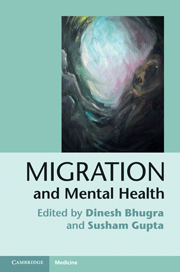Book contents
- Migration and Mental Health
- Migration and Mental Health
- Copyright page
- Dedication
- Contents
- Foreword
- Preface
- Contributors
- Chapter 1 Introduction:
- Section 1 Epidemiology and inequalities
- Section 2 Consequences of migration
- Chapter 9 Migration and its impact on the psychopathology of psychoses
- Chapter 10 Identity, idioms and inequalities:
- Chapter 11 Cultural bereavement, culture shock and culture conflict:
- Chapter 12 Collective trauma
- Chapter 13 Theimpact of acculturative stress on the mental health of migrants
- Section 3 Special groups
- Section 4 Management, services and training
- Section 5 International experiences
- Index
Chapter 10 - Identity, idioms and inequalities:
providing psychotherapies for South Asian women
from Section 2 - Consequences of migration
Published online by Cambridge University Press: 04 February 2011
- Migration and Mental Health
- Migration and Mental Health
- Copyright page
- Dedication
- Contents
- Foreword
- Preface
- Contributors
- Chapter 1 Introduction:
- Section 1 Epidemiology and inequalities
- Section 2 Consequences of migration
- Chapter 9 Migration and its impact on the psychopathology of psychoses
- Chapter 10 Identity, idioms and inequalities:
- Chapter 11 Cultural bereavement, culture shock and culture conflict:
- Chapter 12 Collective trauma
- Chapter 13 Theimpact of acculturative stress on the mental health of migrants
- Section 3 Special groups
- Section 4 Management, services and training
- Section 5 International experiences
- Index
Summary
Keywords
- Type
- Chapter
- Information
- Migration and Mental Health , pp. 128 - 138Publisher: Cambridge University PressPrint publication year: 2010
- 1
- Cited by



